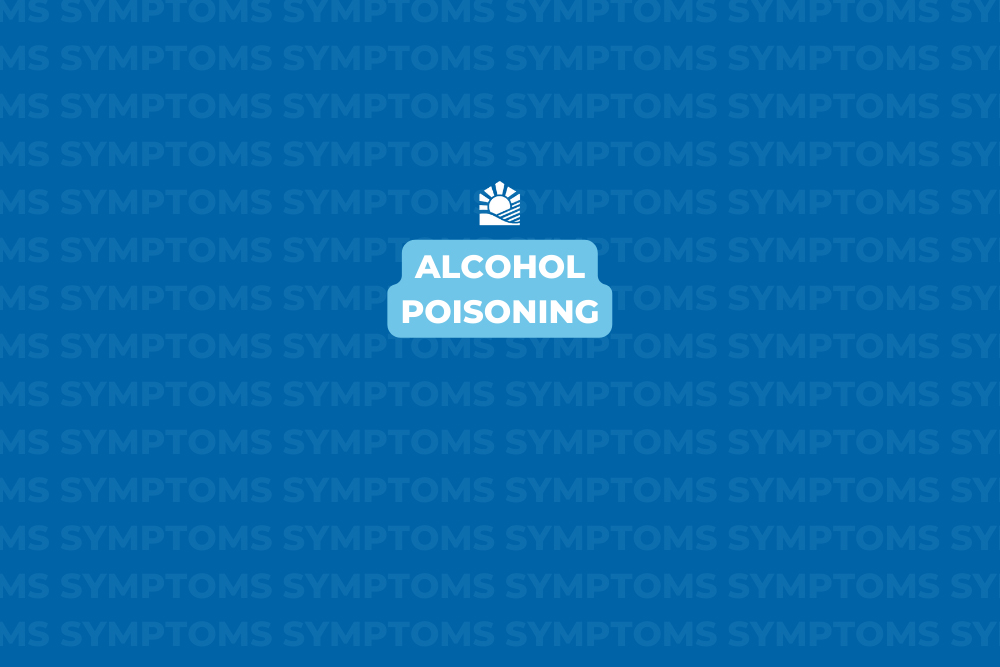Read the latest and greatest from our team
of incredible specialists.

Beach House Recovery Center » Blog » Alcohol Poisoning Symptoms
Alcohol poisoning is a life-threatening condition that occurs when a person consumes excessive amounts of alcohol in a short period.
According to the CDC, in the United States alone, alcohol poisoning claims approximately 2,200 lives annually, with men aged 35 to 65 facing the highest risk.
Recognizing the signs of alcohol poisoning is crucial for seeking immediate medical attention and potentially saving a life. To learn more, contact us directly or continue reading below.

Alcohol poisoning is a severe condition that occurs when a person consumes excessive amounts of alcohol in a short period. This overdose overwhelms the body, leading to the shutdown of vital functions like breathing, heart rate, and temperature regulation.
Alcohol poisoning is a medical emergency that can result in permanent brain damage or death. It’s crucial to recognize the symptoms and seek immediate medical attention if you suspect someone is experiencing alcohol poisoning.
Recognizing the signs of alcohol poisoning is crucial for saving lives. While not everyone will experience all these symptoms, even one or two should be considered a potential emergency if they occur within a short period of heavy drinking.
Key symptoms include:
If you or someone you know exhibits any of these symptoms, it’s essential to call 9-1-1 immediately.
Alcohol poisoning is a medical emergency requiring immediate professional attention. Do not attempt to treat it at home.
If you suspect someone is experiencing alcohol poisoning, follow these steps:
If you believe you are experiencing alcohol poisoning, call 911 immediately and follow these steps:
Remember, alcohol poisoning is a life-threatening condition. Quick action can save lives.
Combining alcohol with certain medications can be deadly. Drugs like opioids, anti-anxiety medications, and sleep aids depress the central nervous system, like alcohol. When these substances are mixed, their effects are amplified, significantly increasing the risk of overdose.
Even small amounts of alcohol can intensify the impact of these drugs, leading to respiratory depression, coma, and even death. If you’re taking any medication, it’s crucial to avoid alcohol consumption altogether to minimize the risk of severe health consequences.
Recovering from alcohol poisoning requires careful monitoring and potential long-term treatment. Following a poisoning incident, medical professionals often recommend follow-up appointments to assess for complications and develop strategies to prevent future occurrences.
Given the high rate of alcohol-related fatalities among individuals with alcohol use disorder, it’s essential to evaluate for addiction and provide appropriate treatment if necessary. Even for those without a diagnosed alcohol addiction, counseling can be beneficial in understanding the factors contributing to excessive drinking and developing strategies to avoid similar incidents in the future.
Prevention is vital to avoiding the devastating consequences of alcohol poisoning. Individuals can significantly reduce their risk by addressing underlying issues and making informed choices.
Alcohol poisoning is a serious and potentially fatal consequence of excessive alcohol consumption. Recognizing the symptoms and seeking immediate medical attention is crucial to preventing tragedy.
If you or someone you know is struggling with alcohol abuse, help is available. Beach House offers comprehensive treatment programs designed to address addiction and support long-term recovery. Our compassionate team is ready to assist you on your journey to a healthier, happier life.
Take the first step toward recovery today. Contact us for a confidential consultation.
Whether you’re researching for yourself or a loved one, Beach House can help. We understand that this is a serious time in your life and that the treatment center you choose matters. We want you to feel comfortable and empowered to make the right decision for yourself, a friend, or a family member. This is why a counselor is waiting and available to answer your questions and help put your mind at ease regarding the next steps. Many of the staff at Beach House have walked in your shoes. If you feel you’re ready or want more information about how to help a loved one, we can help today. You can also learn why we are voted the #1 rehab for addiction treatment in Florida.
We accept most major insurance plans and can verify your benefits quickly and confidentially.
We’re committed to helping you access the care you need, our admissions counselors can guide you through your coverage options and available resources.





"*" indicates required fields